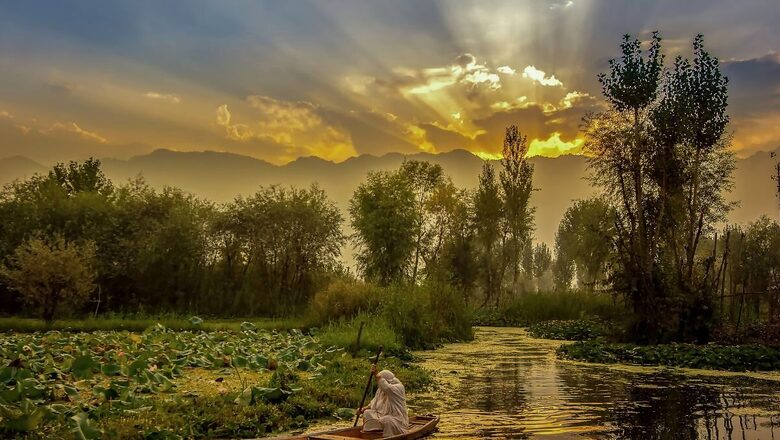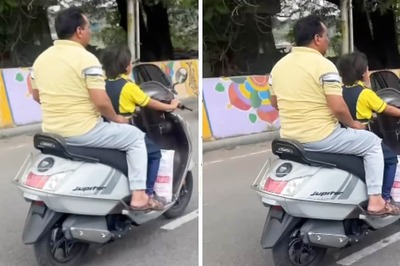
views
The Election Commission (EC) is all set to announce the schedule for the Jammu & Kashmir and Haryana assembly elections at 3pm on Friday.
The term of the legislative assembly of Haryana ends on November 3, while the poll panel plans to hold assembly polls in Jammu and Kashmir before September 30 — the deadline set by the Supreme Court. The Election Commission had also visited Jammu and Kashmir and Haryana recently to oversee the poll preparedness.
Ahead of the announcement of the poll schedule, News18 takes a look at the key events that have transpired in J&K since 2018 when the President’s Rule was imposed.
THE TIMELINE
December 20, 2018: President’s Rule imposed in J&K while exercising powers under Article 356 of the Constitution. This was extended on July 3, 2019.
August 5, 2019: Centre abrogates the provisions of Article 370 that bestowed special status on Jammu and Kashmir. It also announces the bifurcation of the state into Union Territories — Jammu and Kashmir and Ladakh.
August 6, 2019: First petition challenging the presidential order scrapping Article 370 filed by advocate ML Sharma, who was later joined by another lawyer from Jammu and Kashmir, Shakir Shabir.
August 10, 2019: J&K’s National Conference (NC) files a petition contending that the changes brought in the status of the state had taken away the rights of its citizens without their mandate.
August 24, 2019: The Press Council of India moves the Supreme Court, supporting the Centre and Jammu and Kashmir administration’s decision to impose restrictions on communications.
August 28, 2019: A bench headed by then Chief Justice Ranjan Gogoi referred the matter to a five-judge Constitution bench of the Supreme Court.
September 19, 2019: Five-judge Constitution bench set up to hear pleas challenging the abrogation of Article 370.
March 2, 2020: On a batch of pleas challenging the constitutional validity of the Centre’s decision to abolish provisions of Article 370, the Supreme Court declined to refer the matter to a larger seven-judge bench.
July 11, 2023: The apex court observed that it will commence day-to-day hearing from August 2.
September 5, 2023: After hearing the arguments, the Supreme Court reserved a verdict on 23 petitions in the matter after hearing them for a total of 16 days.
December 11, 2023: The Supreme Court upheld the Centre’s decision to abolish Article 370. Also, it stated that steps should be taken to conduct assembly elections in the Union Territory by September 30, 2024.
WHAT CHANGED IN J&K AFTER SCRAPPING OF SPECIAL STATUS?
Jammu and Kashmir no longer has a separate flag, Constitution, or anthem. The citizens of J&K do not have dual citizenship and they will be citizens of India alone. The citizens of J&K now have fundamental rights guaranteed under the Indian Constitution, which was not the case earlier. All laws passed by Parliament are applicable in Jammu and Kashmir, including the Right to Information Act and the Right to Education Act. Any Indian citizen from any part of the country can buy property in the state and take a state government job and enjoy government provisions like scholarships and schemes.
WHAT’S THE SITUATION NOW?
Active militancy has been on the decline in J&K since the abrogation of Article 370. By 2021, terror incidents had plunged to a mere 26, signalling the government’s resolute fight against terror.
Stone-pelting incidents, which had once become the hallmark of Kashmir, are no longer associated with the Valley. In 2018, 1,767 incidents were reported which dropped to zero in 2023. Similarly, incidents of organised bandh/hartals dropped from 52 in 2018 to nil in 2023.
While 199 terrorists were recruited in 2018, the figure was 12 in 2023. Incidents of cross-border infiltration also dropped from 141 in 2019 to 0 in the current year. The number of martyred security forces personnel has also seen a downward trend — the numbers fell from 91 in 2018 to 42 in 2021.
In 2018, 58 Hurriyat leaders were taken into custody. The number swelled to 70 in 2019 and then six in 2020. The security provided to Hurriyat leaders at the government’s expense has been withdrawn and 82 bank accounts of separatists have been frozen.
In June 2023, Home Minister Amit Shah had highlighted the all-round development in Jammu and Kashmir since the abrogation of Article 370 and exhorted the youth of Kashmir to ensure that they carry pens and laptops instead of stones.
“There was a time when bomb blasts, strikes, and stone pelting were common in Kashmir. Today, Kashmiri youths are holding books and laptops in their hands. Equipped with new thinking, they are also challenging the youths of the world in the start-up space,” the minister had said.
In April this year, Prime Minister Narendra Modi had said the process of development and good governance in Jammu and Kashmir after the abrogation of Article 370 is to be seen to be believed. He said the people of the Union Territory have a “new hope” and are “reaping the peace dividend”.
“I would encourage you to visit Jammu and Kashmir to witness first-hand the sweeping positive changes happening on [the] ground. Do not go by what I or others tell you. I went to Jammu and Kashmir just last month. For the first time, people have a new hope in their lives. The process of development, good governance and empowerment of the people is to be seen to be believed,” he told Newsweek.




















Comments
0 comment